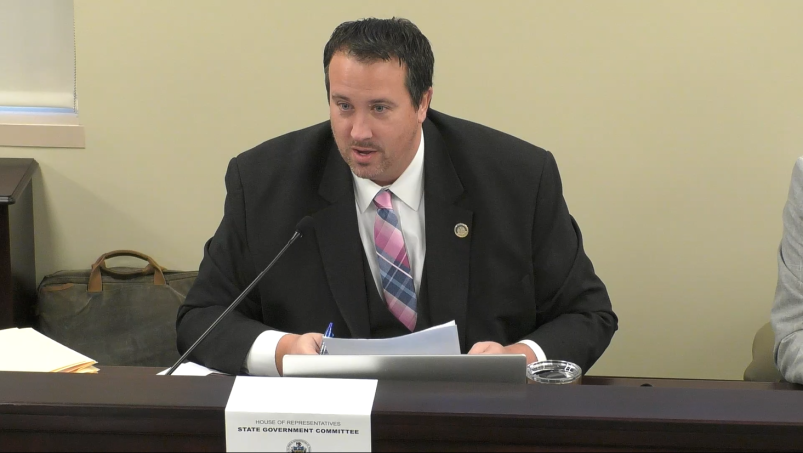New district maps for Pennsylvania’s state legislature have received preliminary approval from a state commission — and prompted outrage from Pennsylvania House Republicans, for whom the maps are not red enough.
Now, they’re pushing a constitutional amendment to give themselves new authority to draw legislative districts. The proposal would take power away from the commission that’s drawn districts for the past 50 years, and which has typically favored Republicans.
The proposed amendment, from House State Government Committee Chair Seth Grove (R), would create a “Citizens’ Legislative Reapportionment Commission” to draw maps. But the full effect of the amendment — which would be approved by a statewide vote and wouldn’t need Gov. Tom Wolf’s (D) sign-off — would tilt the redistricting process dramatically in Republicans’ favor.
Why? Because the swing members of Grove’s proposed commission would be appointed by governmental bodies currently controlled by Republicans. The commission’s maps would require the legislature’s approval. And unlike Pennsylvania’s current system, rejected maps would be redrawn by the legislature, not the commission.
The proposal came after this year’s commission approved preliminary maps that still favored Republicans — but not to the same extent they did in years past, particularly on the state House side.
“I think what’s changed is the [Legislative Reapportionment Commission] put out a map that they don’t like,” said Benjamin Geffen, a staff attorney at the Philadelphia-based Public Interest Law Center, referring to Republican legislators.
‘This Map Needs To Go’
Under Pennsylvania’s current redistricting system, the redistricting commission is composed of four leaders from the state legislature, two from each party, and a chair, usually appointed by the Supreme Court.
And last month, the commission approved preliminary maps that were met with reserved praise from redistricting groups. Fair Districts PA, a non-partisan reform group, said the maps “reverse decades of partisan gerrymandering.”
House Republicans saw things differently.
“This map needs to go,” Grove said late last month of the preliminary statehouse map, the Philadelphia Inquirer reported.
State Rep. Perry Stambaugh (R) said he felt the redistricting commission chair, Mark Nordenberg, had “punished” Stambaugh’s constituents because the representative voted against funding for the University of Pittsburgh. (Nordenberg, who denied the accusation, is the former chancellor of the university and the current chair of its Institute of Politics.)
An analysis by the Inquirer and the Princeton Gerrymandering Project found that the House map favored Republicans, but less so than the current map does.
The Power Grab
Grove’s proposed change, which was passed out of his committee in a party-line vote Monday, would put Republicans in the driver’s seat when it comes to map-drawing.
First, it would create a new, 11-person commission, with eight appointees coming from legislative leaders, one chosen by the Commonwealth Court (which currently has a Republican majority) and two chosen by a vote of county governments, which are mostly Republican — an odd choice that gives tiny rural counties the same vote as heavily populated urban counties.
The proposal for two county appointees struck Geffen, the civil right lawyer, as particularly flawed.
“This is a step back by nearly a century in terms of respecting really basic principles of malapportionment and one-person-one-vote,” he said.
What’s more, the proposal would make it near impossible for the commission to agree on a proposed map, requiring a difficult two-thirds majority vote. And if the commission fails to reach that threshold, the proposal mandates that power to draw districts shift to… the GOP-controlled state legislature.
Redrawing Maps In Time For 2024
Pennsylvania’s Democratic governor has provided a check in recent months to legislative Republicans’ efforts to change election laws, but by pursuing a constitutional amendment, the GOP could circumvent the governor entirely.
Instead, in order to become law, the amendment needs to be passed in two consecutive terms by the legislature, and then again by Pennsylvania voters in a ballot measure.
That could happen as soon as 2023, when, as Fair Districts PA’s legislative director Patrick Beaty pointed out last week, May municipal primary elections could provide the perfect storm: Low turnout, but high Republican motivation.
If successful, the “citizen’s commission” — and therefore, the state legislature — could be in a position to redraw state legislature maps in time for the 2024 elections.
“You could almost admire this scheme for its audacity,” Beaty wrote, “if it was not so outrageous.”



